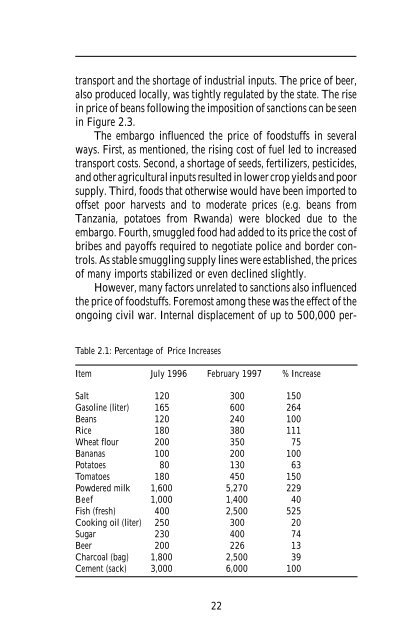The humanitarian impacts of economic sanctions on Burundi
The humanitarian impacts of economic sanctions on Burundi
The humanitarian impacts of economic sanctions on Burundi
You also want an ePaper? Increase the reach of your titles
YUMPU automatically turns print PDFs into web optimized ePapers that Google loves.
transport and the shortage <str<strong>on</strong>g>of</str<strong>on</strong>g> industrial inputs. <str<strong>on</strong>g>The</str<strong>on</strong>g> price <str<strong>on</strong>g>of</str<strong>on</strong>g> beer,<br />
also produced locally, was tightly regulated by the state. <str<strong>on</strong>g>The</str<strong>on</strong>g> rise<br />
in price <str<strong>on</strong>g>of</str<strong>on</strong>g> beans following the impositi<strong>on</strong> <str<strong>on</strong>g>of</str<strong>on</strong>g> <str<strong>on</strong>g>sancti<strong>on</strong>s</str<strong>on</strong>g> can be seen<br />
in Figure 2.3.<br />
<str<strong>on</strong>g>The</str<strong>on</strong>g> embargo influenced the price <str<strong>on</strong>g>of</str<strong>on</strong>g> foodstuffs in several<br />
ways. First, as menti<strong>on</strong>ed, the rising cost <str<strong>on</strong>g>of</str<strong>on</strong>g> fuel led to increased<br />
transport costs. Sec<strong>on</strong>d, a shortage <str<strong>on</strong>g>of</str<strong>on</strong>g> seeds, fertilizers, pesticides,<br />
and other agricultural inputs resulted in lower crop yields and poor<br />
supply. Third, foods that otherwise would have been imported to<br />
<str<strong>on</strong>g>of</str<strong>on</strong>g>fset poor harvests and to moderate prices (e.g. beans from<br />
Tanzania, potatoes from Rwanda) were blocked due to the<br />
embargo. Fourth, smuggled food had added to its price the cost <str<strong>on</strong>g>of</str<strong>on</strong>g><br />
bribes and pay<str<strong>on</strong>g>of</str<strong>on</strong>g>fs required to negotiate police and border c<strong>on</strong>trols.<br />
As stable smuggling supply lines were established, the prices<br />
<str<strong>on</strong>g>of</str<strong>on</strong>g> many imports stabilized or even declined slightly.<br />
However, many factors unrelated to <str<strong>on</strong>g>sancti<strong>on</strong>s</str<strong>on</strong>g> also influenced<br />
the price <str<strong>on</strong>g>of</str<strong>on</strong>g> foodstuffs. Foremost am<strong>on</strong>g these was the effect <str<strong>on</strong>g>of</str<strong>on</strong>g> the<br />
<strong>on</strong>going civil war. Internal displacement <str<strong>on</strong>g>of</str<strong>on</strong>g> up to 500,000 per-<br />
Table 2.1: Percentage <str<strong>on</strong>g>of</str<strong>on</strong>g> Price Increases<br />
Item July 1996 February 1997 % Increase<br />
Salt 120 300 150<br />
Gasoline (liter) 165 600 264<br />
Beans 120 240 100<br />
Rice 180 380 111<br />
Wheat flour 200 350 75<br />
Bananas 100 200 100<br />
Potatoes 80 130 63<br />
Tomatoes 180 450 150<br />
Powdered milk 1,600 5,270 229<br />
Beef 1,000 1,400 40<br />
Fish (fresh) 400 2,500 525<br />
Cooking oil (liter) 250 300 20<br />
Sugar 230 400 74<br />
Beer 200 226 13<br />
Charcoal (bag) 1,800 2,500 39<br />
Cement (sack) 3,000 6,000 100<br />
22
















